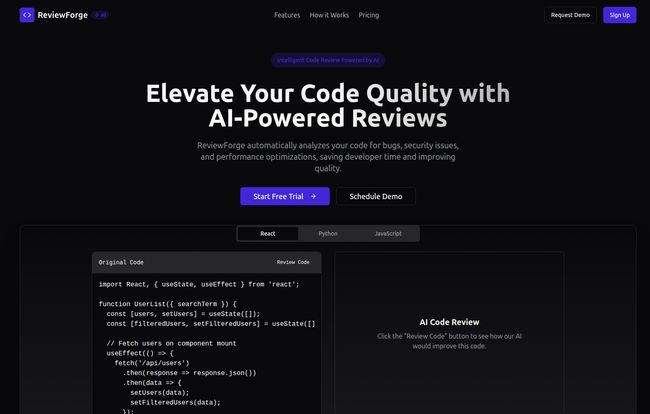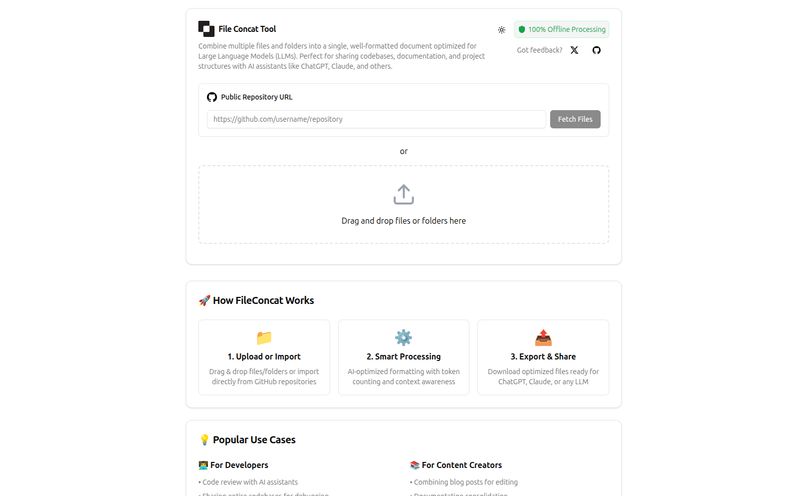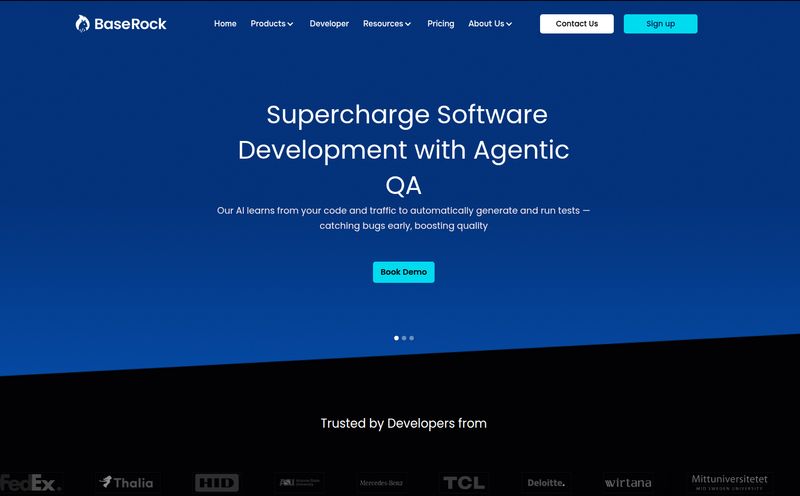Let’s have a little chat. You, me, and the ever-present, soul-crushing reality of the pull request queue. As someone who lives and breathes traffic generation and site performance, I can tell you that nothing kills momentum like a development bottleneck. And the biggest bottleneck of all? Manual code reviews.
We’ve all been there. You push some code you’re proud of, and it just… sits. For days. Waiting for that one senior dev who has five minutes to spare between twelve meetings. When they finally get to it, you get a cryptic “LGTM” or a comment that makes you question all your life choices. It's a slow, often frustrating dance.
The industry has been buzzing for years about AI coming to the rescue. A magical bot that can review code with the wisdom of a seasoned architect and the speed of a machine. I've been skeptical, to say the least. Most tools I’ve seen are just glorified linters. But then I stumbled upon a new player called ReviewForge, and I have to admit, my curiosity is piqued.
So, What Exactly Is ReviewForge?
At its heart, ReviewForge claims to be an AI-powered code review platform. Think of it less as a strict rule-enforcer and more as a helpful, always-on digital teammate. Its job is to automatically scan your code every time you submit it, looking for the nasty stuff before a human ever has to.
It’s not just about catching a misplaced semicolon. The platform is designed to analyze your code for potential bugs, glaring security holes, and performance drains. The goal is simple but ambitious: improve the quality of your codebase while giving your developers back their most precious resource—time. And in our world, time is money, clicks, and conversions.

Visit ReviewForge
The Core Features That Caught My Eye
A flashy landing page is one thing, but the devil is in the details. I took a look under the hood at what ReviewForge is actually offering, and a few things stood out.
Automated Pull Request Reviews with a Brain
This is the main event. Instead of a human spending 30 minutes reading through every line, ReviewForge’s AI steps in first. The key here is the promise of actionable feedback. The website shows a perfect example with a React `useEffect` hook—a notorious source of bugs if you forget to add dependencies to the array. The AI doesn’t just flag it; it explains the problem and offers a one-click fix. That's a huge step up from a vague “this is wrong” comment. It’s like having a patient mentor who not only points out your mistake but shows you how to correct it.
More Than Just Syntax: Bug and Security Hunting
As an SEO, I’m obsessed with site security. A single vulnerability can tank your rankings, destroy user trust, and land you in a world of hurt. The idea of catching these issues at the code-writing stage—what the industry calls the “shift-left” approach—is massive. It's infinitely cheaper and less stressful to fix a security flaw before it ever goes live. ReviewForge’s ability to scan for common vulnerabilities and bugs is, for me, one of its most compelling features. It’s preventative medicine for your website's health.
Performance Tweaks and Quality Metrics
Slow websites don't rank. Period. While we often focus on image compression and server response times, inefficient code is a silent killer of site speed. ReviewForge’s performance optimization analysis promises to find those sluggish loops and inefficient queries that drag your pages down. It also provides quality metrics and visualizations, which is gold for team leads who need to justify their team’s work and track the reduction of the dreaded technical debt over time.
How ReviewForge Fits into Your Existing Workflow
Here’s something I’ve learned from years of consulting: if a tool is a pain to set up, no one will use it. It doesn’t matter how amazing it is. The ReviewForge team seems to get this. They talk a lot about seamless integration with the tools your team already uses every day—Git providers (like GitHub, GitLab), CI/CD systems, and even IDEs. This isn't some clunky, separate platform you have to log into. It's designed to become a natural part of the development process, providing feedback right where developers are working. That is the only way a tool like this gets adopted.
The Good, The Bad, and The… Coming Soon
Alright, let's get down to brass tacks. No tool is perfect, especially a new one. Here's my honest breakdown.
First, the good stuff. The potential to save an incredible amount of developer time is undeniable. Freeing up senior engineers from routine review tasks to focus on complex architecture is a massive win. The resulting improvement in code quality means a more stable product, happier users, and fewer 3 a.m. emergency patches. The feedback seems genuinely helpful, which could also be a fantastic training tool for junior developers, helping them learn best practices on the fly.
Now for the caveats. The site and provided info mention that it’s “primarily optimized for Gerrit and Gitea.” This is an interesting choice. While many startups go straight for the GitHub juggernaut, focusing on these other platforms suggests they’re solving a real pain point for a dedicated, if smaller, community. For teams on GitHub or GitLab, it might mean the experience isn’t as polished yet. It's something to keep a close eye on.
And the biggest question mark of all: the pricing. The pricing page currently has a big, fat “Coming Soon” sign. On one hand, this means you can probably get in early. On teh other, it makes it hard for a business to budget or commit. Will it be a per-seat model? Per-repo? I'm hoping for a transparent structure that scales well for small teams and large enterprises alike. They do promise that all plans will include the core features and a free trial, which is encouraging.
My Honest Take: Is ReviewForge Worth Watching?
So, what’s the final verdict? The market for developer tools is incredibly crowded. You have static analysis tools, security scanners, and even GitHub’s own Copilot is getting smarter. But ReviewForge seems to be carving out a specific niche: making the review process itself intelligent and automated.
It’s not just a linter screaming about style guides; it’s trying to be a genuine assistant that understands context. For teams, especially those already on Gerrit or Gitea, this could be a game-changer. For the rest of us, it’s a platform to watch with great interest.
I’ve signed up to be notified when their pricing goes live. If the price is right and the support for other Git platforms matures, I could easily see ReviewForge becoming an indispensable part of a modern development stack.
Frequently Asked Questions about ReviewForge
What is ReviewForge?
ReviewForge is an AI-powered platform designed to automate the code review process. It integrates with your development workflow to analyze code for bugs, security vulnerabilities, and performance issues, providing developers with immediate, actionable feedback.
How does ReviewForge improve code quality?
By proactively scanning every piece of code before it's merged, ReviewForge acts as an automated quality gate. It catches common errors, potential security risks, and inefficient code patterns early, helping teams maintain a higher standard and reduce long-term technical debt.
What tools does ReviewForge integrate with?
It is built to integrate with popular development tools, including Git providers, CI/CD pipelines, and IDEs. It is currently highlighted as being primarily optimized for Gerrit and Gitea, with broader support likely to follow.
Is ReviewForge free? What's the pricing?
The pricing plans for ReviewForge are still being finalized and are listed as “Coming Soon” on their website. However, they have stated that all future plans will include a free trial to test out the platform.
Who is the ideal user for ReviewForge?
The platform is ideal for software development teams of all sizes, from startups to large enterprises. It's particularly useful for individual developers wanting instant feedback, and for team leads or DevOps engineers looking to standardize code quality and improve team efficiency.
Does ReviewForge replace human code reviewers?
Not at all. The goal is to augment human reviewers, not replace them. By handling the routine checks for bugs, style, and common security flaws, the AI frees up human developers to focus on what they do best: assessing the core logic, architecture, and overall strategy of the code. It handles the tedious work so humans can handle the smart work.
A Smarter Future for Code
Tools like ReviewForge represent a shift in how we approach software development. It’s about building smarter, not just working harder. By embedding intelligent automation directly into our daily workflows, we can create better, safer, and faster products. I, for one, am excited to see where it goes. The days of the endless PR queue might just be numbered. And I don’t think anyone will be sad to see them go.
Reference and Sources
- ReviewForge Official Website
- What is Shift-Left? - An article from Red Hat explaining the security concept mentioned.


